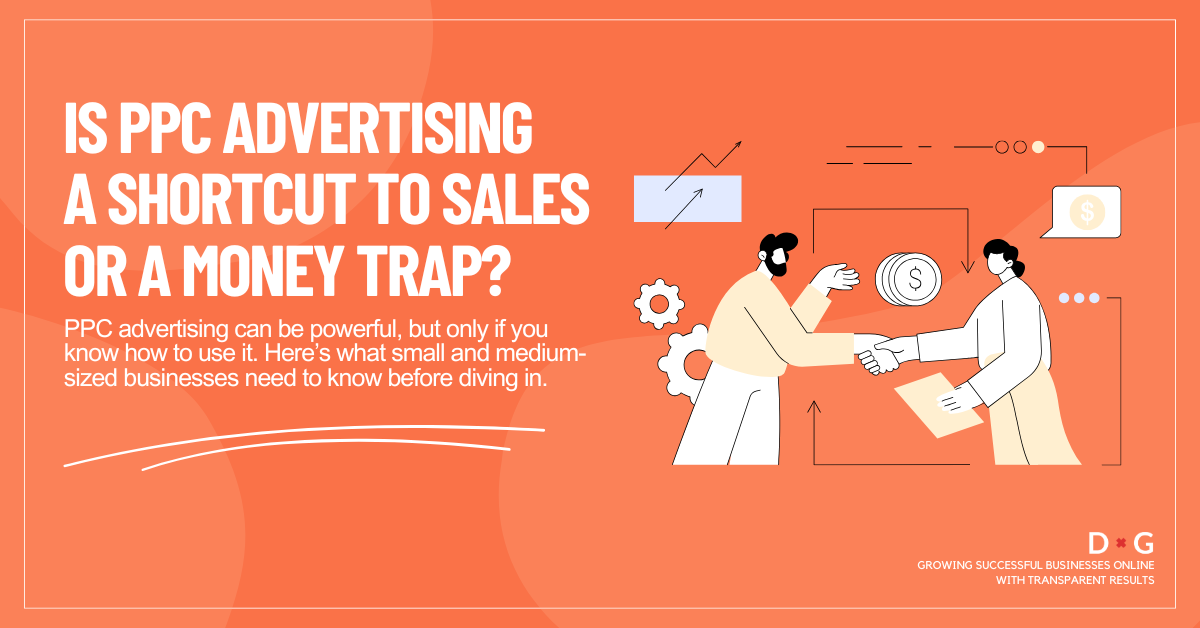
Is PPC advertising a shortcut to sales or a money trap for small businesses? As a small or medium-sized business owner in Australia, you may have heard about PPC advertising. PPC stands for “Pay-Per-Click.” It means you pay a fee every time someone clicks your online ad. Many businesses love PPC ads because they can drive quick traffic and sales. But is PPC advertising always good? Or can it become an expensive mistake?
In this blog post, we’ll clearly explain how PPC advertising works. We’ll also cover the good points, the bad points, and how to avoid losing money. Let’s get started!
How Does PPC Work?
PPC advertising is a simple way to get your business in front of potential customers online. You place ads on platforms like Google, Facebook, or Instagram, and only pay a fee when someone actually clicks on your ad.
Here’s how PPC works step by step:
- You create ads with certain keywords or target customers.
- People searching online see your ads.
- They click your ads and are led to the page you provided.
- You pay for each click you get.
Benefits of PPC Advertising for Small Businesses
PPC advertising offers small businesses a fast and flexible way to attract customers online.
Here are some key benefits that make it a smart choice when done right.
Fast Results
PPC advertising helps small businesses quickly reach customers. Unlike Search Engine Optimisation (SEO), PPC ads can show instant results. You can start seeing visitors and sales within hours or days of starting your campaign.
Control Over Budget
With PPC, you control how much you spend. You can set daily budgets. This way, you only spend what you’re comfortable investing. PPC also gives you clear reports on your ad’s performance. You’ll know exactly what you’re paying for and if it’s working.
Reaching the Right Customers
PPC ads let you show your business to the exact people you want to reach. You can target ads based on age, location, interests, and more. Showing ads to the right people increases your chances of getting new customers.
Risks of PPC Advertising for Small Businesses
PPC advertising can help your business grow, but it can also become a money trap if you’re not careful.
Common Mistakes Small Businesses Make
Many small businesses lose money by making these common PPC mistakes:
- Choosing keywords that are too broad.
- Writing unclear or misleading ads.
- Using poorly made landing pages.
- Not watching or improving ads regularly.
Signs Your PPC Ads are Losing Money
Here are some clear signs that your PPC campaigns are turning into money traps:
- You get lots of clicks but not enough sales.
- You’re spending more money than you earn.
- You don’t understand PPC reports or metrics.
- You’re not regularly checking and improving your campaigns.
How to Make PPC Advertising Profitable
PPC advertising doesn’t need to be a money trap. Follow these simple steps to keep your PPC campaigns profitable.
Set Clear Goals
Before spending any money, decide what your goal is. Ask yourself these questions:
- Do you want to increase sales?
- Are you aiming for more website visitors?
- Is brand awareness your goal?
Setting clear goals helps you measure success clearly and improve over time.
Choose the Right Keywords or Target Interests
Reaching the right people starts with selecting the right keywords and audience interests.
For search campaigns, use keyword research tools to identify terms your ideal customers are likely to use. For social media ads, focus on relevant audience interests, behaviours, and demographics that align with your offering.
Avoid broad or vague targeting, as it can lead to irrelevant clicks and wasted ad spend. The more accurate your targeting, the more likely you are to get quality traffic that converts.
With PPC, you’re reaching people who already have intent, who already have interest, thus making every click more likely to turn into a customer.
Create Strong Landing Pages
Your landing page is the webpage people land on after clicking your ad. Make sure your landing page clearly matches your ad’s message. Your page must show visitors exactly what you want them to do next, like buying your product or contacting you.
Monitor and Improve Regularly
Never set your PPC ads and forget them. Always check your results regularly. Make changes when things aren’t working well. Constant improvements mean you spend less and earn more from PPC ads.
Alternatives to PPC Advertising
If PPC feels risky or costly, try other effective marketing methods:
- SEO or Search Engine Optimisation: Improve your website so it shows organically in Google search results.
- Social Media Marketing: Post regularly on social media to connect with customers.
- Content Marketing: Create helpful content like blogs and videos to attract customers.
- Email Marketing: Use email to nurture customer interest with relevant news, tips, and promotions.
For better outcomes, businesses often integrate PPC with other digital marketing efforts.
Conclusion
So, is PPC advertising a shortcut to sales or a money trap for small businesses? The truth is, it can go either way, success or waste, depending on how well you manage your PPC ads.
If you avoid common mistakes and exercise caution with your spending, PPC can help your small business grow without becoming an expensive mistake.
Need help managing your PPC campaigns?
If you’d rather focus on running your business than decoding ad dashboards and keyword strategies, we, Digital Guide, can help. We specialise in PPC advertising for small and medium businesses and know how to turn clicks into real customers without wasting your budget.
Let’s make PPC a powerful part of your marketing strategy, together. Get in touch today and see how we can help you grow.
